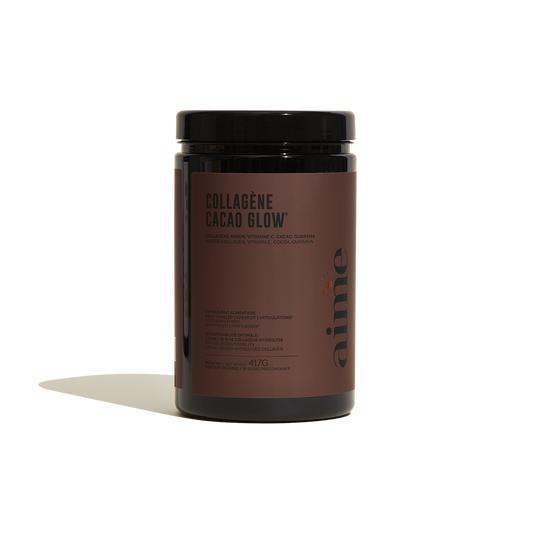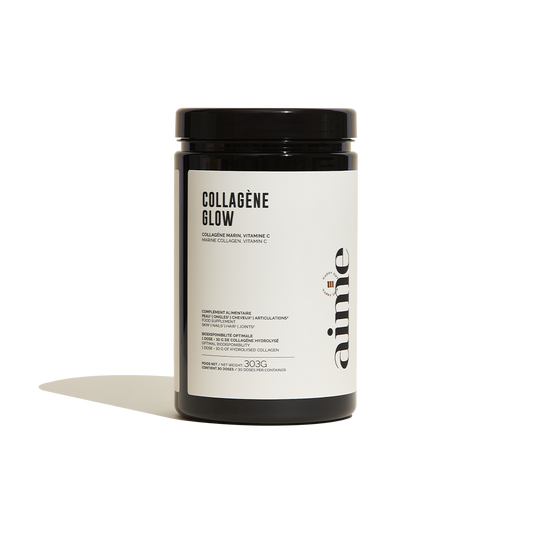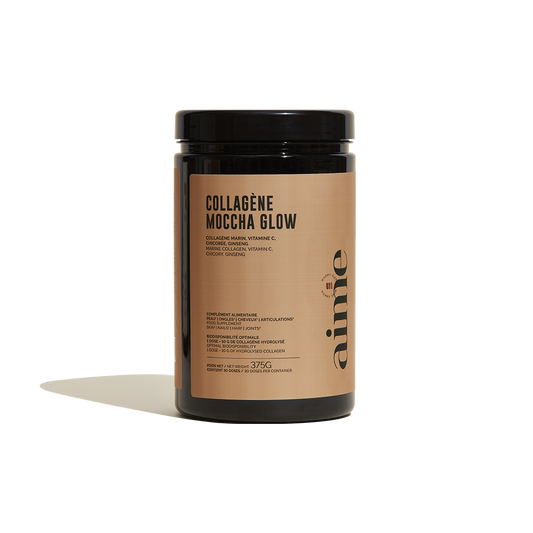Collagen and pregnancy: a midwife answers all your questions

Planning a baby, current pregnancy or postpartum: many of you are asking questions about the usefulness (and possible risks) of taking collagen as a food supplement during this key period of your life.
We've enlisted the help of a midwife, Marine Dubel-Jam, to answer any questions you may have. You'll see how Aime Marine Collagen can be your ally around the arrival of your baby: before, during, and after pregnancy.
Can you take collagen while pregnant?
The lack of independent medical studies on the subject does not allow us to formally recommend taking collagen during pregnancy. Studies involving pregnant and/or breastfeeding women are generally not permitted.
However, with the advice of a healthcare professional, this dietary supplement can be safely consumed during pregnancy and/or breastfeeding. It's even a good idea.
- Collagen: the framework of our body
Collagen is an essential protein ubiquitous in our bodies that plays a critical role in organ development and tissue repair. Think of it as the framework of our body, organizing our cells in three dimensions via the extracellular matrix.
- A key role at the placenta level
During pregnancy, we know that collagen metabolism plays a key role, particularly in the placenta, the amniotic membrane, and therefore the interface between the mother and the fetus. Some studies also show that collagen expression is a factor that promotes the proper implantation of the pregnancy.
- More flexible fabrics to follow the body's evolution
During this very special period for the body, the notion of remodeling is very interesting with the idea that the skin, joints and blood vessels are led to evolve to face new mechanical and chemical constraints, notably with this famous hormonal impregnation.
Newsletter
Subscribe to the newsletter to make sure you don't miss any articles!
What are the benefits of collagen for pregnant women, the embryo and then the fetus?
There are five benefits of marine collagen during pregnancy:
- Better healing
Accelerating and improving the process of wound healing and tissue regeneration, particularly after childbirth, for example in the case of an episiotomy or tear or a caesarean section.
- Fewer stretch marks
Prevention of the occurrence of stretch marks and/or reduction of those already present
- Less joint pain
Collagen can play a role in reducing pregnancy-related joint pain. More than one in two women experience lower back pain, especially in the last trimester. This isn't surprising when you consider that you can gain up to 25% of your body weight in excess, which means a change in posture to maintain balance! More than one in four women also suffer from pelvic pain.
- Bone strengthening
Limiting the osteoporosis process. Little is known, but during pregnancy and breastfeeding, the mother's bone metabolism undergoes significant changes to meet the calcium needs of the fetus and newborn. Pregnancy and breastfeeding cause transient bone loss, with complete recovery most often occurring within 6 to 12 months after weaning.
- Pelvic floor tone
Strengthening the pelvic floor muscles and ligaments is essential, as the perineum supports the increasing weight of the uterus and fetus. However, hormonal changes during pregnancy can cause its tissues to become more flexible, making it more vulnerable to strain and injury.
Are there any risks to be aware of, any precautions to take?
Collagen is naturally synthesized by the fetus, particularly to enable the formation of its own organs. It is therefore not considered harmful by nature.
During breastfeeding, there is no pathophysiological link between collagen intake and lactation.
There are no reported adverse effects for pregnant women. The main precaution to take is to ensure that there is no possible drug interaction with any ongoing treatment by seeking advice from the doctor or midwife who specifically monitors each pregnancy.
Taking a food supplement should not replace the continuation of a varied and balanced diet throughout pregnancy, as well as the usual prescribed supplements, namely iron, folic acid and vitamin D obtained on prescription and compliance with which is essential.
To do this, consider adding collagen-rich foods to your menu, such as bone marrow and chicken bone broth, for example. Not always appetizing! Also, turn to foods rich in vitamins and amino acids that help boost our natural collagen synthesis:
- Dairy products
- Eggs, rich in proline and glycine
- Avocado, rich in vitamin E
- Red fruits with antioxidant properties
- Kiwi, rich in vitamins C and E
- Oilseeds
A varied and balanced diet therefore already provides numerous benefits to pregnant women, to which marine collagen supplementation can be added to increase these effects.
The Collagène Aime range is made up of bioavailable 4000Da hydrolyzed marine collagen, enriched with vitamin C from acerola to promote its assimilation and strengthen its antioxidant and protective effect.
Some formulas with gourmet flavors are enhanced with natural ingredients that are well-suited to pregnant women, such as chicory for digestion and the boosting effect as an alternative to coffee, or even anti-inflammatory turmeric .
Collagen Glow, neutral in taste , can also be drunk in cold or hot water to provide the recommended 10g of collagen per day with vitamin C and nothing more!
Do collagen supplements help with labor?
We read in unsourced articles that collagen promotes the opening of the cervix during childbirth. This is false. The role of collagen is mainly to strengthen the cervix, which is composed of more than 80% collagen fibers. Not to soften it. At the time of labor, hormones break down these famous collagen fibers to allow the cervix to dilate, which is completely paradoxical with what can be mentioned in articles that do not cite their medical sources.
On the other hand, what is very interesting and scientifically proven is that collagen plays a real role in what is called "cervical competence", that is to say the capacity of the woman's body to carry a pregnancy for several months while maintaining significant cervical tone in the face of significant and increasing gravity. The fibers are parallel and tight, thus ensuring the rigidity of the tissue.
Furthermore, certain pathologies causing a collagen deficiency (Ehlers-Danlos syndrome in particular) give rise to multiple miscarriages or threats of premature birth due to this anomaly.
During postpartum, how can a collagen treatment help new mothers recover?
Postpartum is a period of physical and psychological changes that can be challenging for new mothers. Beyond any form of aesthetics, we're talking about feeling good in your own body and benefiting from good recovery and therefore a form of fulfillment on all levels. In addition to a rich and varied diet and rest, taking marine collagen-based food supplements can act on several levels:
The skin has just been overstressed by mechanical tension, which has led to a certain sagging and the possible appearance of stretch marks, which are actually breaks in the collagen fibers. These physiological phenomena can be difficult to accept. The perineal area may also have been severely affected; some women will have a cesarean scar to heal.
Collagen then plays a vital role in restoring optimal structure to the skin and enabling proper tissue healing.
- Better joint comfort
The body is challenged by postural imbalances, the distribution of the woman's new weight, and hormonal upheavals. It is not uncommon to hear women complain of joint pain at the end of pregnancy. We find this famous collagen again in our tendons, cartilage, and ligaments, stretched mainly in the pelvis to allow the baby to pass through. It ensures the cohesion of our joints but also their hydration via the secretion of synovial fluid. Continuing appropriate physical activity also helps reduce these problems during and after pregnancy, once perineal rehabilitation has been completed.
- Controlled hair loss
Following the sudden drop in estrogen levels after childbirth, hair loss occurs physiologically. Don't panic! Collagen helps to counteract this phenomenon by providing the hair follicle with the amino acids needed to produce keratin for the growth of thick, shiny hair .
Aime has developed the Hair & Scalp Boost supplement which also provides probiotics, biotin, folic acid and rice protein to strengthen the scalp and promote the growth of healthy and strong hair.
A word from the midwife, Marine Dubel-Jam
“ Pregnancy is a wonderful time of introspection that allows every woman to take stock of the power she has over her own body. It's the perfect opportunity to question her lifestyle habits, as well as her physical and mental health. All this while being in a perpetual state of reworking the body and mind for 9 months, giving rise to new questions to learn how to take care of yourself."
Cited in this article


Collagène Cacao Glow Collagen Supplement


Collagène Glow Collagen Supplement





